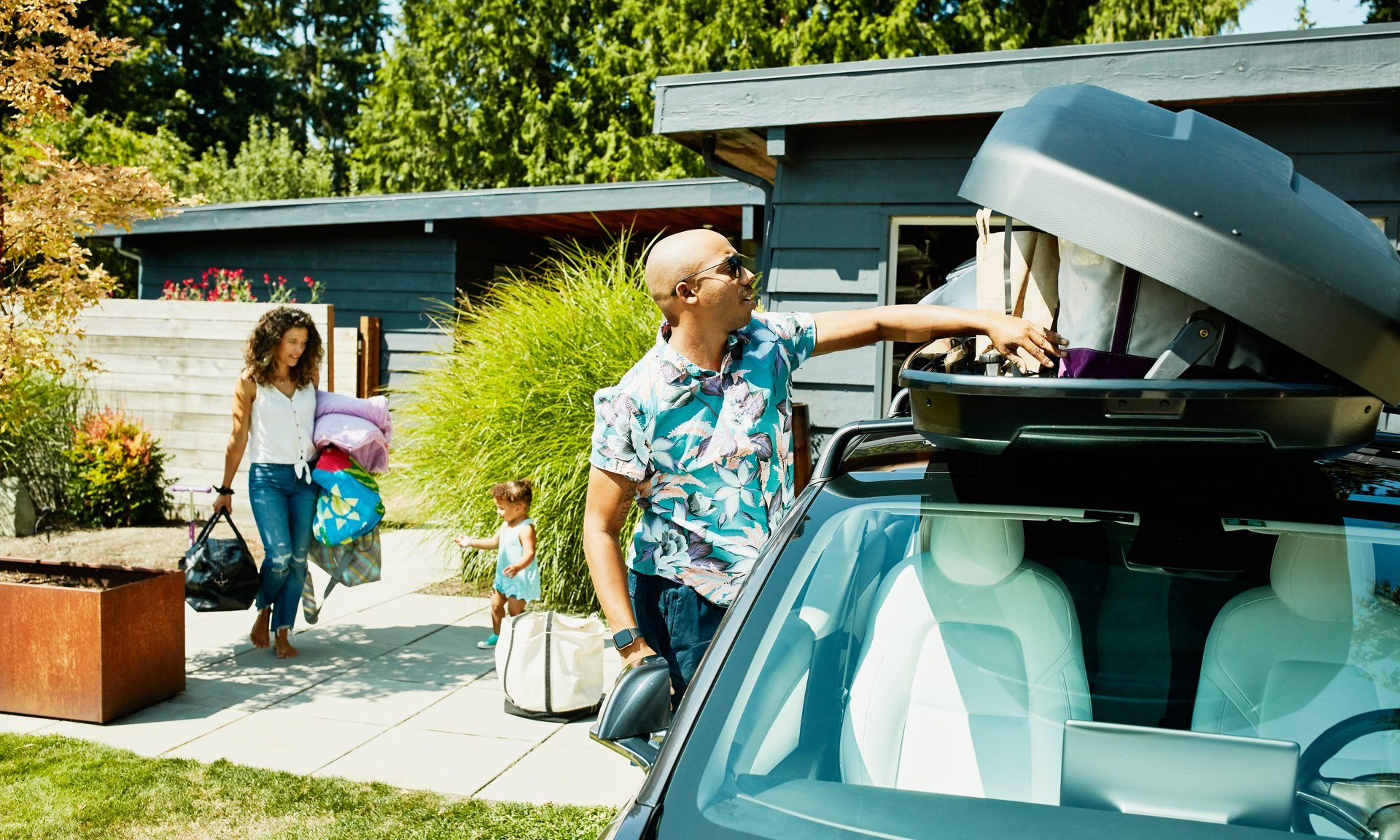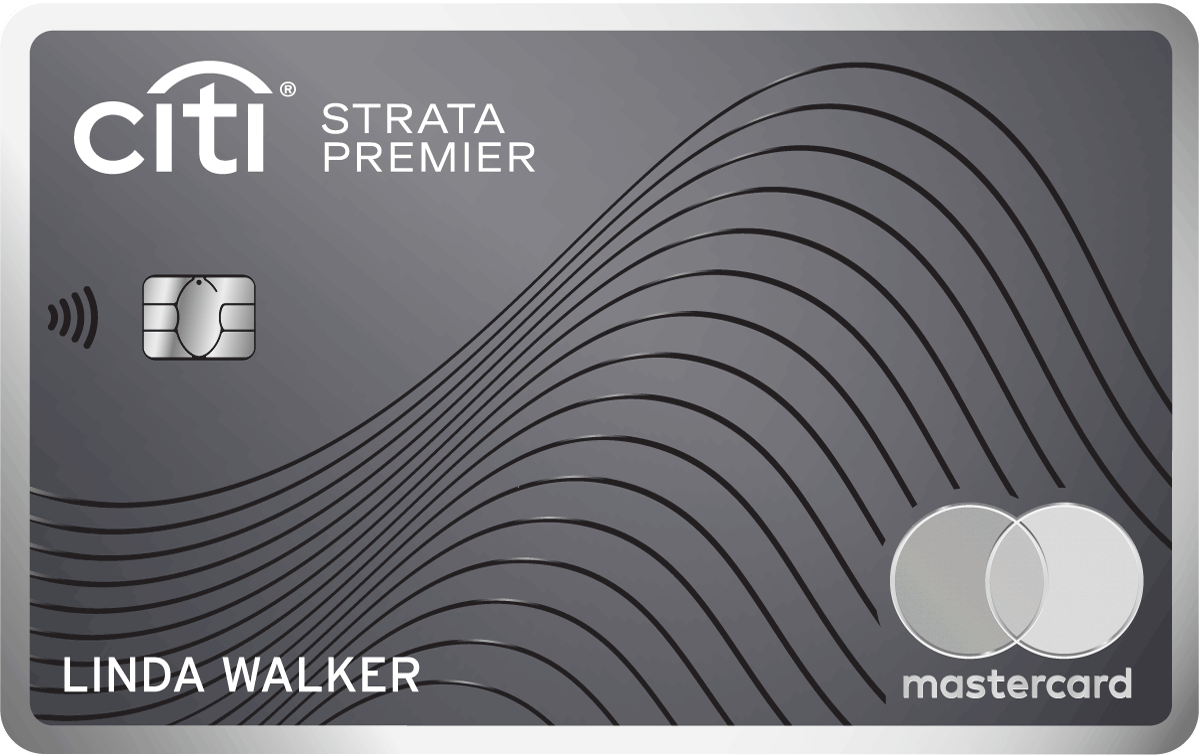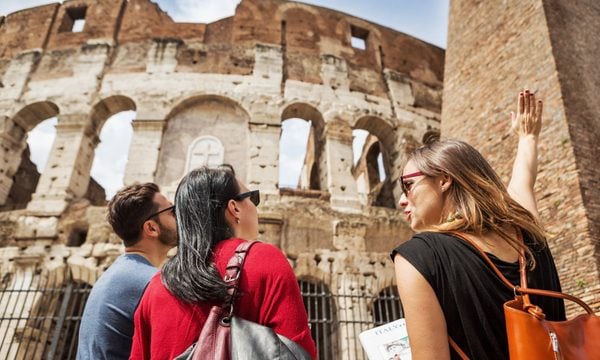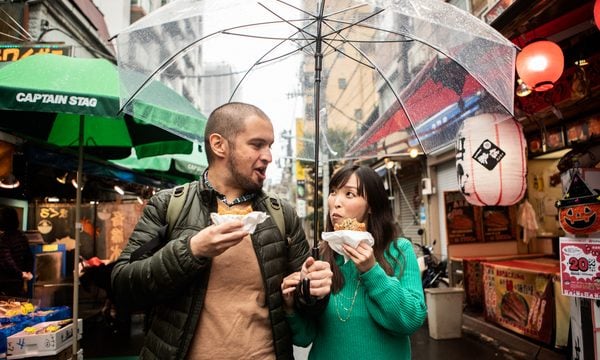Travel Inflation Report: February 2026
Travel prices overall are up compared to this time last year, driven by flight, entertainment and dining costs.

Many or all of the products on this page are from partners who compensate us when you click to or take an action on their website, but this does not influence our evaluations or ratings. Our opinions are our own.
Overall travel costs are up year-over-year, especially when it comes to flights, eating out and entertainment.
Average U.S. travel costs are 1% higher compared to this time in 2025, according to NerdWallet's Travel Price Index, which combines data from individual travel categories tracked by the Bureau of Labor Statistics' (BLS) Consumer Price Index, such as airfares, lodging, meals and rental cars.
Airfare costs are up 2.2% over the past year, while the costs of eating out and entertainment are up 4.0% and 5.0%, respectively. However, not all travel categories are showing increases. Lodging costs are down 3.2%, while car rentals prices are down 1.2%. To help put those numbers in perspective, overall prices for the past 12 months through January 2026 rose 2.4% before seasonal adjustment, according to BLS data.
Prices are slightly higher based on the data versus last year, but travelers can take advantage of some smart moves to reduce the price of their next trip. Check out our money-saving travel suggestions below.

By signing up, you will receive newsletters and promotional content and agree to our Terms of Use and acknowledge the data practices in our Privacy Policy. You may unsubscribe at any time.
Travel costs today vs. pre-pandemic
The Travel Price Index shows a 1% change in travel prices from January 2025.
Relative to pre-pandemic prices, January 2026 travel costs are up 17% versus January 2020 (the last full equivalent month before the 2020 COVID-19 pandemic). That's far lower than the 26.1% price increase across all items.
Not every product experiences inflation at the same rate — especially when it comes to travel. Some trips might actually be more or less expensive than in the past, depending on if you're driving versus flying, if you’re staying in a hotel and whether it involves a rental car.
To help you better understand how travel prices have changed, NerdWallet honed in on five categories:
- Airfare.
- Car rentals.
- Food away from home.
- Hotels.
- Movies, theaters and concerts.
NerdWallet then compared those costs to prices from one month and one year earlier.
And to broaden the perspective, the data also compares today’s prices to prices 10 years ago. Here’s what today’s travel prices look like:
How airfares have changed
When comparing January 2026 prices to January 2025, U.S. airfares are up by 2.2%.
If you zoom out, the outlook is not as bleak: Compared to prices 10 years ago, airfares are actually down by 2.6%. It's pretty unheard of for prices to drop over that period of time, especially considering that the prices for all items tracked by BLS are up 37.4% over that same period.
| How airfare prices have changed | ||
|---|---|---|
| January 2026 vs. December 2025 (MoM) | Up 6.9%. | |
| January 2026 vs. January 2025 (YoY) | Up 2.2%. | |
| January 2026 vs. January 2016 (Change over the past 10 years) | Down 2.6%. | |
So if airfares are down over the past decade, why do they feel so high? There are a few reasons, including unbundling, where airlines advertise lower fares (often in the form of basic economy seats that offer few frills).
Those low base fares typically come with upcharges in the form of ancillary fees to check bags, to guarantee an aisle seat or to secure early boarding. Those extra prices are not captured in this data — despite it still impacting one’s travel budget.
One storyline to watch is airline consolidation, especially as low-cost carriers struggle financially. Whenever airlines merge, go out of business or even pull out of key markets, that usually translates to less competition on certain routes. These situations give other airlines more pricing power to charge higher fares on certain routes.
How hotel room rates have changed
Average U.S. hotel and motel room rates are down by 3.2% over the past year. That's good news for travelers, as it means they can generally expect to pay less for the same hotel room this year than they did last year.
Compared to 10 years ago, travelers may be feeling the pinch though, as hotel room rates are up 17.6% over the past decade. However, that's still a good deal less than the 37.4% increase across all items.
| How lodging prices have changed | ||
|---|---|---|
| January 2026 vs. December 2025 (MoM) | Up 3.2%. | |
| January 2026 vs. January 2025 (YoY) | Down 3.2%. | |
| January 2026 vs. January 2016 (Change over the past 10 years) | Up 17.6%. | |
How rental car prices have changed
High rental car prices were one of the biggest stories of pandemic-era travel. Since then, prices have come down — although they remain much higher compared to before the pandemic.
Rental car prices are down 1.2% compared to the year prior.
| How car rental prices have changed | ||
|---|---|---|
| January 2026 vs. December 2025 (MoM) | Down 1.3%. | |
| January 2026 vs. January 2025 (YoY) | Down 1.2%. | |
| January 2026 vs. January 2016 (Change over the past 10 years) | Up 21.7%. | |
How restaurant prices have changed
Food prices consistently rise nearly every month, and in January 2026, the cost of food away from home was up 4.0% versus a year prior.
The cost of dining out has increased dramatically in the past decade, with January 2026 prices 50.2% higher than what they were 10 years ago. That's higher than the 37.4% inflation rate across all items, meaning restaurant prices have risen more than many other categories of goods.
| How restaurant prices have changed | ||
|---|---|---|
| January 2026 vs. December 2025 (MoM) | Up 0.1%. | |
| January 2026 vs. January 2025 (YoY) | Up 4.0%. | |
| January 2026 vs. January 2016 (Change over the past 10 years) | Up 50.2%. | |
How the price of movies, theaters and concerts has changed
Tickets for movies, theaters and concerts are also rising faster than the average rate of inflation, up by 5.0% over the past year. With the cost of dining and entertainment outpacing the rate of inflation, that could suggest that Americans are prioritizing experiences over physical things.
| How the prices of movies, theaters and concerts have changed | ||
|---|---|---|
| January 2026 vs. December 2025 (MoM) | Down 0.7%. | |
| January 2026 vs. January 2025 (YoY) | Up 5.0%. | |
| January 2026 vs. January 2016 (Change over the past 10 years) | Up 41.4%. | |
Smart money move: Use travel rewards cards to book
Paying for travel with points and miles versus cash isn’t as daunting a task as it may seem. Frequent flyer miles and hotel points can be accrued not just for recurring travel, but through other outlets as well. Credit card rewards and welcome bonuses can be one of the most popular ways to accrue a big stash of points for a lot less effort than living your life out of a suitcase.
In addition, travel credit cards can offer various money-saving perks, like:
- Savings on checked bags.
- Cash back credits that can offset the annual fee.
Here are some of the best credit cards that offer travel-related statement credits.
Top travel cards
Annual fee
$795.
$95.
Rewards earn rate
• 8 points per $1 spent on all travel booked through Chase.
• 4 points per $1 spent on bookings directly through an airline or hotel.
• 3 points per $1 spent on dining, takeout and eligible delivery worldwide.
• 1 point per $1 spent on all other purchases.
• 10 ThankYou® points per $1 spent on hotels, car rentals and attractions booked through Citi's travel portal.
• 3 points per $1 on air travel and other hotel purchases.
• 3 points per $1 on supermarkets.
• 3 points per $1 on gas stations and EV charging stations.
• 3 points per $1 on restaurants.
• 1 point per $1 on all other purchases.
Still not sure?
If you’re planning 2026 travel…
If you’re building your next vacation budget based on how much you've spent in the past, you might need to factor in spending more on certain categories that are trending up in price. Fortunately, you can still save on travel with a little planning.
To avoid the costs of eating out, head to local grocery stores — which can be a fun activity on its own — or pack snacks from home. While in an airport, head to the lounge. Many credit cards have partnerships with airport lounge networks (Priority Pass is a popular one) where you can typically expect complimentary snacks and drinks.

By signing up, you will receive newsletters and promotional content and agree to our Terms of Use and acknowledge the data practices in our Privacy Policy. You may unsubscribe at any time.
Methodology
NerdWallet conducted an analysis of the Bureau of Labor Statistics’ Consumer Price Index data released by the U.S. Department of Labor, which was most recently updated in February 2026 and measures prices of items like travel, groceries and cars. Some prices change more than others.
Keep in mind, this data is based on January 2026 information, even though it is released in February 2026. Prices you see may have increased or decreased compared to this data, because it lags one month behind. Due to the government shutdown in 2025 that prevented the collection and release of October 2025 data, we used September 2025 data instead for any month-over-month or year-over-year percent change calculations involving October 2025 data.
And even within the realm of travel, some expenses might go up, while others might go down.
The NerdWallet Travel Price Index combines data from the Consumer Price Index, weighted by the estimated spending in each category, which is based on 2019 travel expenditure data from the BLS.
Here are the spending categories considered, and how heavily each was weighted:
- Flights: 36%.
- Car rental: 6%.
- Lodging: 30%.
- Food: 21%.
- Entertainment: 7%.
How to maximize your rewards
You want a travel credit card that prioritizes what’s important to you. Here are some of the best travel credit cards of 2026:
- Flexibility, point transfers and a large bonus: Chase Sapphire Preferred® Card
- No annual fee: Wells Fargo Autograph® Card
- Flat-rate travel rewards: Capital One Venture Rewards Credit Card
- Bonus travel rewards and high-end perks: Chase Sapphire Reserve®
- Luxury perks: American Express Platinum Card®
- Business travelers: Ink Business Preferred® Credit Card
Article sources
NerdWallet writers are subject matter authorities who use primary,
trustworthy sources to inform their work, including peer-reviewed
studies, government websites, academic research and interviews with
industry experts. All content is fact-checked for accuracy, timeliness
and relevance. You can learn more about NerdWallet's high
standards for journalism by reading our
editorial guidelines.
On this page
- Travel costs today vs. pre-pandemic
- How airfares have changed
- How hotel room rates have changed
- How rental car prices have changed
- How restaurant prices have changed
- How the price of movies, theaters and concerts has changed
- Smart money move: Use travel rewards cards to book
- If you’re planning 2026 travel…
Limited Time Only: Earn $1,000 Toward Travel!
Capital One Venture Rewards Credit Card 
Travel

For a limited time, the
Capital One Venture Rewards Credit Card is offering new cardholders an especially rich bonus: Enjoy $250 to use on Capital One Travel in your first cardholder year, plus earn 75,000 bonus miles once you spend $4,000 on purchases within the first 3 months from account opening - that’s equal to $1,000 in travel!
More like this
Related articles









